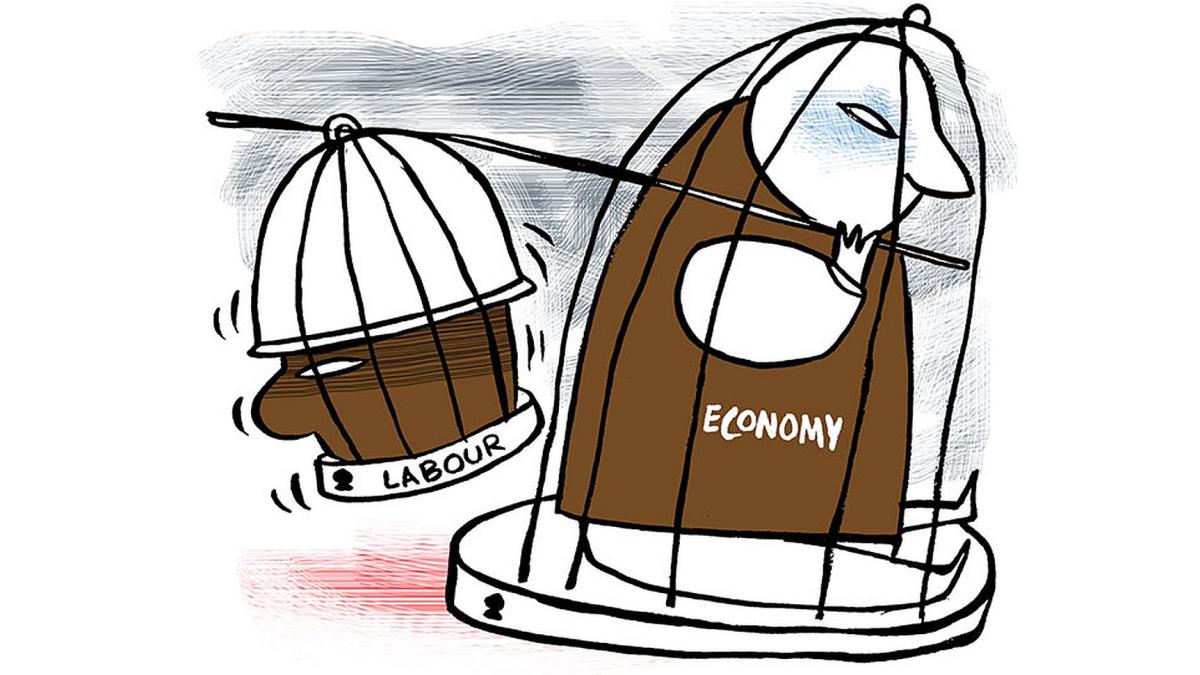India's Social Security Coverage Rises to 48.8%: Mandaviya
India's social security coverage has significantly increased, reaching 48.8% in 2024, highlighting the country's commitment to social justice. Union Labour Minister Mansukh Mandaviya highlights key achievements in social security, labor reforms, and the e-Shram portal.

Illustration: Uttam Ghosh/Rediff.com
New Delhi, Feb 24 (PTI) Social security remains a fundamental pillar of India's commitment to social justice, Union Labour Minister Mansukh Mandaviya on Monday said, noting that its coverage increased to 48.8 per cent of the total population in 2024 from 24.4 per cent in 2021.
Addressing the inaugural session of the Regional Dialogue on Social Justice 2025, Mandaviya said, "The unemployment rate has declined from 6 per cent in 2017-18 to 3.2 per cent in 2023-24, while the Labour Force Participation Rate has increased from 49.8 per cent to 60.1 per cent".
These positive indicators underscore the impact of our reforms and initiatives. Labour reforms have been a foundation of India's efforts to modernise its workforce policies, he added.
The consolidation of 29 labour laws into four simplified Labour Codes has promoted labour welfare, universalised wages and social security, and ensured safer working conditions, he pointed out.
These reforms have also improved the ease of doing business by streamlining
registration, license, and compliance procedures, the minister noted.
"Social security remains a fundamental pillar of India's commitment to social justice. The ILO's World Social Protection Report 2024-26 highlights India's remarkable progress, reaching 48.8 per cent in 2024. We are in the process of further collecting the data with the ILO," Mandaviya said.
Social security schemes run by the Employees' State Insurance Corporation (ESIC) and Employees' Provident Fund Organisation (EPFO) have been modernised to extend coverage to more workers, he added.
The e-Shram portal, with over 300 million registered unorganised workers, exemplifies the government's efforts to strengthen last-mile delivery of social benefits.
During the session, the minister also launched the e-Shram mobile app to enhance accessibility and convenience for workers across the nation. The e-Shram portal is a national database of informal workers and provides links for social security and welfare schemes.
The workers can download their e-Shram cards and get benefits of welfare schemes seamlessly through the app.
It also provides a grievance redressal mechanism.
A joint statement on Responsible Business Conduct by the Bharatiya Mazdoor Sangh (BMS) in collaboration with the Confederation of Indian Industry-Employers' Federation of India (CII-EFI) was also issued on Monday.
Mandaviya said the joint statement reflects a shared commitment to support ethical and sustainable business practices that respect workers' rights, promote decent work, and support inclusive economic growth.
It also emphasised the need for businesses to go beyond compliance, integrating social responsibility into their core operations and value chains. By prioritising worker well-being, ensuring fair wages, and upholding workplace safety, businesses can contribute to a more just and resilient society, he added.
The statement also underscores the importance of collaboration between employers, workers, and policymakers in building a future of work that is both equitable and sustainable, the minister pointed out.
On the announcement of Indian businesses, industry bodies and workers bodies joining the global coalition for social justice, he said, "This highlights the willingness of Indian businesses and workers' organisations to shoulder the responsibility to build a socially just and inclusive society with the Government of India".
"The next five years present a unique opportunity to realise our vision of 'Sabka Vikas' -- balanced growth for all regions and communities. Employment trends in India reflect the success of these policy interventions," he added.
Empowering women is another critical focus area, he said, adding that India's Union Budget 2025-26 sets an ambitious target of achieving 70 per cent female workforce participation by 2047.
On reaping the demographic dividend, he noted that with 65 per cent of India's population being under the age of 35, skill development is a national priority.
Mandaviya noted that the employability of Indian graduates has risen from 33.95 per cent in 2013 to 54.81 per cent in 2024.
The National Career Service Portal has facilitated over 440 million job vacancies, he stated.
India's startup ecosystem, the third-largest in the world, and its status as the "GCC Capital of the World" are creating new opportunities in the technology and healthcare sectors, he pointed out.
International Labour Organization Director-General Gilbert F Houngbo said that according to the World Social Protection Report 2024-26, the proportion of India's population covered under at least one branch of social protection has increased from 24 per cent to 49 per cent, almost doubling in a very short time.
"This remarkable achievement reflects the strong partnership between India and the ILO and the decisive actions taken by the Modi government in expanding social protection in the past few years.
"I salute this tremendous progress in social protection, which serves as a model for the rest of the world. India's efforts not only benefit its own citizens but also inspire other nations to improve their own social protection systems...I acknowledge India's collaboration with ILO on social protection," he added.
India is organising the first ever "Regional Dialogue" in collaboration with the Global Coalition for Social Justice and International Labour Organization on February 24-25, 2025, in New Delhi.
The Global Coalition for Social Justice is a landmark initiative by the ILO to bring global, regional and national actors together for policy and action coherence towards advancing social justice.
Launched in November 2023, the coalition has been joined by 336 partners, including 90 governments, within a short span.
India as a founding member of ILO and a key member in the Coordinating Group of the Global Coalition is playing a crucial role in the coalition for furthering the agenda of social justice.
Addressing the inaugural session of the Regional Dialogue on Social Justice 2025, Mandaviya said, "The unemployment rate has declined from 6 per cent in 2017-18 to 3.2 per cent in 2023-24, while the Labour Force Participation Rate has increased from 49.8 per cent to 60.1 per cent".
These positive indicators underscore the impact of our reforms and initiatives. Labour reforms have been a foundation of India's efforts to modernise its workforce policies, he added.
The consolidation of 29 labour laws into four simplified Labour Codes has promoted labour welfare, universalised wages and social security, and ensured safer working conditions, he pointed out.
These reforms have also improved the ease of doing business by streamlining
registration, license, and compliance procedures, the minister noted.
"Social security remains a fundamental pillar of India's commitment to social justice. The ILO's World Social Protection Report 2024-26 highlights India's remarkable progress, reaching 48.8 per cent in 2024. We are in the process of further collecting the data with the ILO," Mandaviya said.
Social security schemes run by the Employees' State Insurance Corporation (ESIC) and Employees' Provident Fund Organisation (EPFO) have been modernised to extend coverage to more workers, he added.
The e-Shram portal, with over 300 million registered unorganised workers, exemplifies the government's efforts to strengthen last-mile delivery of social benefits.
During the session, the minister also launched the e-Shram mobile app to enhance accessibility and convenience for workers across the nation. The e-Shram portal is a national database of informal workers and provides links for social security and welfare schemes.
The workers can download their e-Shram cards and get benefits of welfare schemes seamlessly through the app.
It also provides a grievance redressal mechanism.
A joint statement on Responsible Business Conduct by the Bharatiya Mazdoor Sangh (BMS) in collaboration with the Confederation of Indian Industry-Employers' Federation of India (CII-EFI) was also issued on Monday.
Mandaviya said the joint statement reflects a shared commitment to support ethical and sustainable business practices that respect workers' rights, promote decent work, and support inclusive economic growth.
It also emphasised the need for businesses to go beyond compliance, integrating social responsibility into their core operations and value chains. By prioritising worker well-being, ensuring fair wages, and upholding workplace safety, businesses can contribute to a more just and resilient society, he added.
The statement also underscores the importance of collaboration between employers, workers, and policymakers in building a future of work that is both equitable and sustainable, the minister pointed out.
On the announcement of Indian businesses, industry bodies and workers bodies joining the global coalition for social justice, he said, "This highlights the willingness of Indian businesses and workers' organisations to shoulder the responsibility to build a socially just and inclusive society with the Government of India".
"The next five years present a unique opportunity to realise our vision of 'Sabka Vikas' -- balanced growth for all regions and communities. Employment trends in India reflect the success of these policy interventions," he added.
Empowering women is another critical focus area, he said, adding that India's Union Budget 2025-26 sets an ambitious target of achieving 70 per cent female workforce participation by 2047.
On reaping the demographic dividend, he noted that with 65 per cent of India's population being under the age of 35, skill development is a national priority.
Mandaviya noted that the employability of Indian graduates has risen from 33.95 per cent in 2013 to 54.81 per cent in 2024.
The National Career Service Portal has facilitated over 440 million job vacancies, he stated.
India's startup ecosystem, the third-largest in the world, and its status as the "GCC Capital of the World" are creating new opportunities in the technology and healthcare sectors, he pointed out.
International Labour Organization Director-General Gilbert F Houngbo said that according to the World Social Protection Report 2024-26, the proportion of India's population covered under at least one branch of social protection has increased from 24 per cent to 49 per cent, almost doubling in a very short time.
"This remarkable achievement reflects the strong partnership between India and the ILO and the decisive actions taken by the Modi government in expanding social protection in the past few years.
"I salute this tremendous progress in social protection, which serves as a model for the rest of the world. India's efforts not only benefit its own citizens but also inspire other nations to improve their own social protection systems...I acknowledge India's collaboration with ILO on social protection," he added.
India is organising the first ever "Regional Dialogue" in collaboration with the Global Coalition for Social Justice and International Labour Organization on February 24-25, 2025, in New Delhi.
The Global Coalition for Social Justice is a landmark initiative by the ILO to bring global, regional and national actors together for policy and action coherence towards advancing social justice.
Launched in November 2023, the coalition has been joined by 336 partners, including 90 governments, within a short span.
India as a founding member of ILO and a key member in the Coordinating Group of the Global Coalition is playing a crucial role in the coalition for furthering the agenda of social justice.
You May Like To Read
TODAY'S MOST TRADED COMPANIES
- Company Name
- Price
- Volume
- Vodafone-Idea-L
- 11.36 ( -2.49)
- 94664837
- AvanceTechnologies
- 1.16 (+ 4.50)
- 34522155
- Sunshine-Capital
- 0.26 ( -3.70)
- 29015901
- Alstone-Textiles
- 0.27 ( -3.57)
- 28695959
- Mehai-Technology
- 1.65 ( -4.62)
- 28262795






